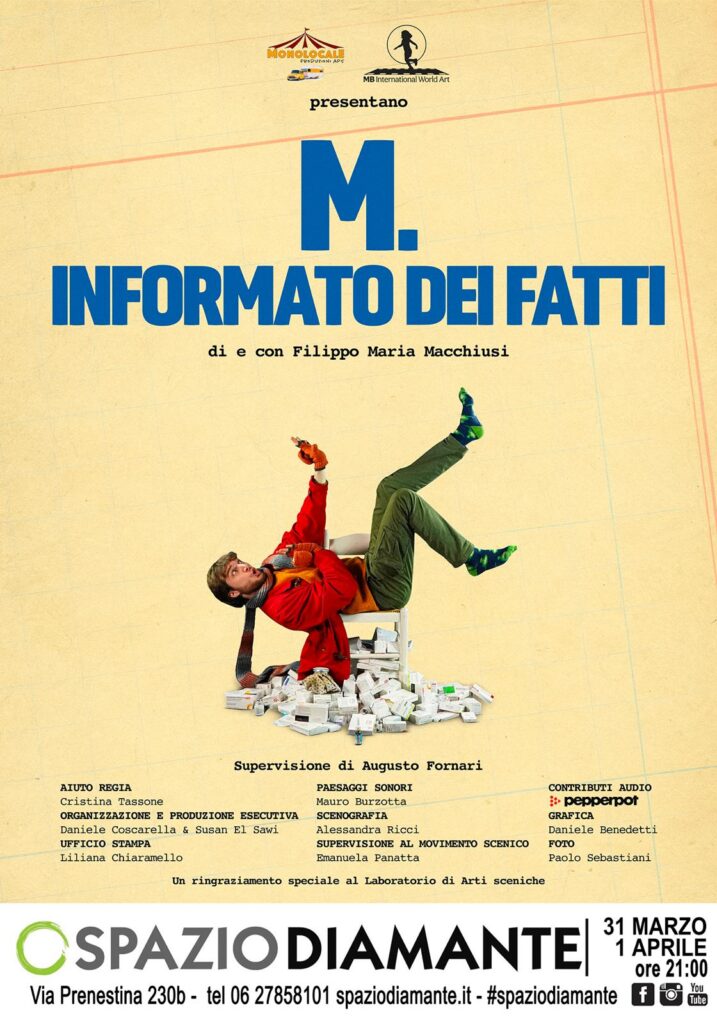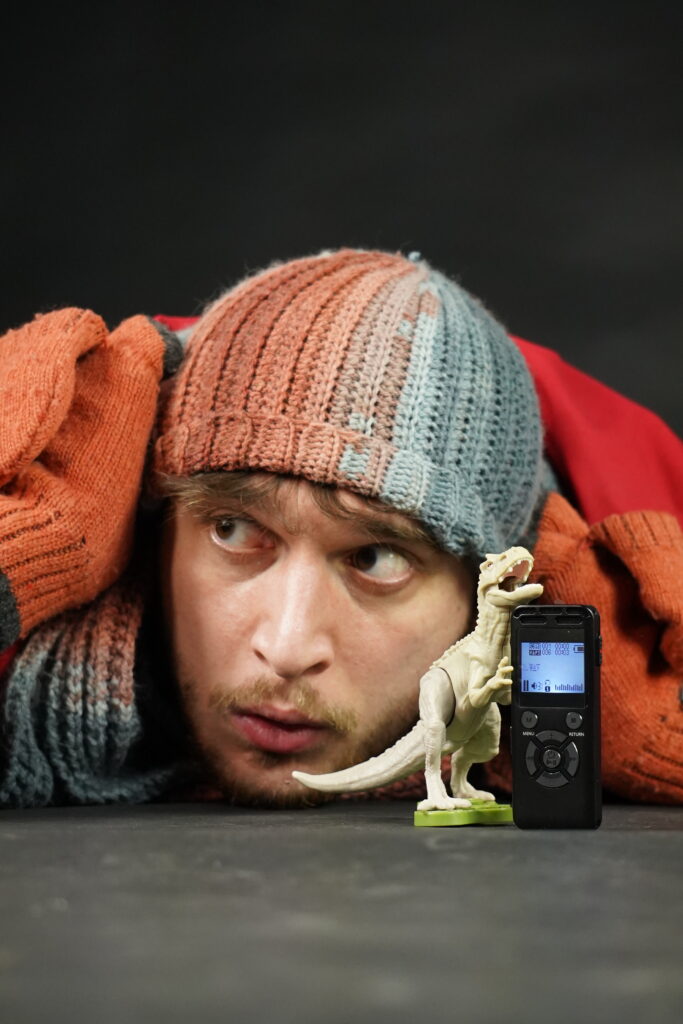Filippo Macchiusi “I hope to wring a laugh and maybe a reflection. From Giallini I learned the art of availability.”
“My first goal is to entertain people, I hope to get a laugh out of them. Then if we add an underlying reflection to it all the better, but the show is primarily a fun show.” This is how actor and author Filippo Macchiusi describes his new tragicomic monologue ‘M. Informed of the facts’ actor and author Filippo Macchiusi, who will be staged tonight and tomorrow night at Spazio Diamante in Rome.
‘M. ‘Informed of the Facts’ is a dramatic comedy that explores the twisted and intricate inner world of the unidentified protagonist ‘M’. A symbol of his generation’s instability, M gets lost in the meanders of his memories in order to report, to a stunned and incredulous marshal, a heinous crime of which only he is precisely…informed of the facts. Through brilliant dialogue and paradoxical situations bordering on irony, the play invites the viewer to question what truth is and how much our perception can influence our judgment. When at the end of his account we are also ‘Informed of the facts,’ will we really be able to judge the culprit?
We discussed this with the author.

The show is a tragicomic monologue. Why did you choose this kind of structure?
“The idea was to develop the story within a judicial setting where M, the protagonist, goes to the barracks to put a deposition on record. And the monologue was the most appropriate form to tell his point of view, in which we slowly lose ourselves and make it become ours as well. To understand it, a la ‘the usual suspects.’ Emphasizing how our opinions, no matter how objective we think they are, are always filtered through our memories and feelings. And the monologue was perfect to emphasize this: stories are never all the way through as we tell them.”
Over the course of the narrative we enter more and more into the mind of the protagonist, an unstable character typical of his generation. Does the work portend to be a social denunciation?
“I wrote this monologue three years ago, and I don’t know if I was aware of this intent then. But reasoning in retrospect, indeed this historical period is marked by a lack of reference points. Now that I am bringing the play to the stage, the theme is perhaps even more topical; I see fewer and fewer points of reference: everything has entered a crisis and we have to find a strategy to get out of it. In the story, M. finds his own strategy-even if it is extreme. And I don’t know how the viewer can react once he has taken a journey in his head.”
M. however, in making his statement, tries at all costs to prevent the viewer from arriving at an objective truth of the facts. What is truth for you, is there really one?
“This is a difficult question. Today the most powerful man in the world, the president of the United States of America, claims that there are as many truths as there are truths being told. It is the logic of the filter, we think we are communicating something but inevitably something else comes to others. We live immersed in fake news. However, I cannot say whether this objective truth is that important; what I think we should do is to learn more to empathize with others to understand what their truth is. M. also confronts a system, the judiciary, that reasons too much in absolutes. There are those who are guilty and those who are not. But they are very clear-cut roles, and when M. with his narrative challenges this paradigm we realize that it is not so obvious to understand what we have before us. If really, that is, what he denounces he has done is right or wrong.”

The story is cloaked in a veil of mystery that the viewer removes along with the protagonist. The viewer himself has an active role in putting the pieces of the puzzle in order, eventually becoming ‘informed of the facts’ as well. What will this new awareness bring him?
“He decides it himself, the spectator. Clearly M.’s is a game; he knows very well what and why he is playing. He understands very well that he is standing in front of two officers, the marshal and the deputy, who expect him to report a crime. But he doesn’t want to get to the point. He caresses it, gets close to it and makes it foreboding but never dwells on it; he knows very well how to keep the attention. He talks about a mobster he is friends with and then about stalking, making him think he has reached the end. But then he veers to the last and makes it clear what he is really talking about. I think that basically this can make the audience think about the meaning of the concept of guilt and guilty. M. is there under the pretext of confessing to a crime he committed, but once we know his story thoroughly, can we really stand as his judges? In his place would we have done differently? It is interesting to question this issue, even as a society.”
Although the story is based on a dramatic event, M.’s surreal interceding makes everything very ironic. How important is it to use irony to tell dramatic stories?
“I think it’s fundamental. I am a great admirer of Mattia Torre, who was a magician in telling very dramatic themes with irony. Laughing allows you to exorcise even the most serious things, and irony allows us to see things from the least obvious points of view while also helping to convey the message you want to send across. For me, irony and paradox are the two highest forms of comedy.”
Let’s talk about you. You became an actor after a path that portended anything but, in fact, you studied to become a doctor. Why the change of course?
“It’s true I’m a doctor, I also worked for a year as soon as I finished my studies. In both environments it is very important to manage the relationship with one’s emotions. To be an author and an actor is to constantly have an opinion; to be a doctor is to find a balance with one’s emotions so as not to be drowned by them, but the actor vice versa takes full advantage of the emotions. I feel like a doctor, it’s part of me, and even in this play I carry it with me. However, it is all declined to being what I want to be: an actor and an author.”
In spite of your young career, you have had the opportunity to work with well-known personalities in show business, among them Marco Giallini. How did this meeting affect you?
” He is a person with an immense heart, from him I learned the importance of the art of availability in an actor. I had a small part in a television series he worked on, and he never missed an opportunity to come to us young actors to give us advice and motivate us. His behavior taught me that the greatest are the most humble people. I hope one day to reciprocate because in my work the more you give the more you receive. And he gives so much because he truly loves what he does, and to see him up close posing in this way is something I will carry with me forever.”
What do you hope the viewer will take away at the end of your performance?
” First a few laughs. Then maybe even the impetus for a reflection on what truth is and what it means to be guilty of something. I hope to get people to empathize with others before judging, because reality is never as simple as it may seem to us.”







